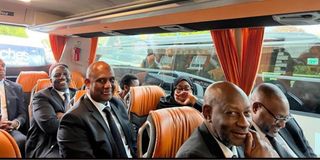Africans are own worst enemies

African leaders being transported on a coach provided by the United Kingdom government for the leaders attending the burial ceremony of Queen Elizabeth II at Westminster Abbey.
Had I been in Johannesburg, South Africa, on Wednesday this week, I too would have given President William Ruto a standing ovation for his highly articulate keynote address delivered at the third Pan-African Parliamentary Summit, which focused on Climate Policy and Equity.
It was a sterling performance that summed up clearly the challenges facing Africa, during which he urged the continent’s leaders to speak in one voice on how to tackle the deleterious effects of climate change, not merely as passive recipients of goodwill from countries that have contributed to destroying the earth through pollution, but as active participants in seeking lasting solutions.
However, what caught my attention was his expression of outrage that African leaders are too often taken for granted on such weighty issues and the major decisions made in their absence only for them to be summoned for dinner and photo-op sessions.
“The discussive profile of our own continent,” he said, “has too often been focused on the challenges and difficulties we face, and the assistance we need in a way that depicts us as chronically subordinate, eternally vulnerable and perpetually incapable. As a consequence, an emerging psychology of victimhood implicates both African and global leadership in a politics of pity and helplessness.
“It also denies the world’s youngest continent, a repository of unparalleled abundance, the agency to articulate appropriate solutions for its own problems and to offer its unique, indispensable solutions on the broader global stage.”
By ‘youngest continent’, it can be assumed that President Ruto was talking about Africa’s demographic dividend— the proportion of the working age population far exceeding those who can’t work due to age. This should be an advantage, but it isn’t due to historical injustices which can hardly be addressed by the perpetrators of those same injustices.
This is the second time in less than a month that President Ruto has expressed displeasure at the way African leaders are treated by their counterparts, especially in the West. On April 29, participating during the Mo Ibrahim Foundation African Leadership Ceremony in Nairobi, he lamented: “We have these meetings, Africa-US, Africa-Europe, Africa-Turkey, now we are waiting for Africa-Russia and Africa-Japan. We have decided that it is not intelligent for 54 of us to go and sit before one gentleman from another place... Sometimes we are mistreated, we are loaded into buses like school children and it is not right.”
He was referring to the occasion when African Heads of State were herded into buses during the State burial of Queen Elizabeth II in September last year. This humiliation so early in his presidency must have left a lasting negative impression on Dr Ruto, considering that other dignitaries from the West never boarded any bus.
Grim reality
However, lamenting publicly about the indignities visited on visiting African leaders by Western countries is one thing; determining why such things happen is the more difficult task, a grim reality for most Africans visiting Western countries.
If such things can happen to invited heads of sovereign states, how are ordinary folks treated, and why? Many people retort that quite often, racism is at work. However, that is oftentimes a mere cop-out. There must be some other reasons why Africans always bear the brunt of this racism. One of them is that not only do we disrespect one another, we also disrespect our own race.
Has anyone wondered why no African country has ever succeeded in uplifting itself from economic doldrums more than six decades since Independence? Can we still keep blaming former colonial powers for it when we know that we dedicatedly keep tying ourselves to the yoke of dependency because our political leaders consistently mismanage our economies? Inevitably, if we cannot rule ourselves, we will always be ruled by others, for our own weaknesses make us vulnerable to manipulation.
We still sell our bountiful resources for a song and then loudly complain about the injustice of it all. We kowtow to Western conglomerates because we believe if they pull out our people will starve to death without food aid.
We allow those who regard the continent’s mineral and oil resources as a free-for-all bonanza for whoever can extract them at little cost to themselves so long as they pay a pittance in tax and buy our leaders’ acquiescence. We allow mind-boggling corruption to drain what is left of those resources and then roam Western – and increasingly, Eastern—capitals with begging bowls or seek exorbitant loans which we cannot repay without much pain.
We are our own worst enemies but we don’t even know it and those who do and point it out are silenced as agitators and enemies of the people. We are forced to obey the dictates of the Bretton Woods institutions to balance our books if we do not want to be blacklisted, prescriptions that are often inimical to the welfare of ordinary Africans, and to make matters worse, we have serially failed to manage our politics leading to turmoil every election cycle. Why shouldn’t the rest of the world treat us, collectively, as the wretched of the earth to be discriminated against like a big tribe of dark-skinned retards?
Mr Ngwiri is a consultant editor; [email protected]





